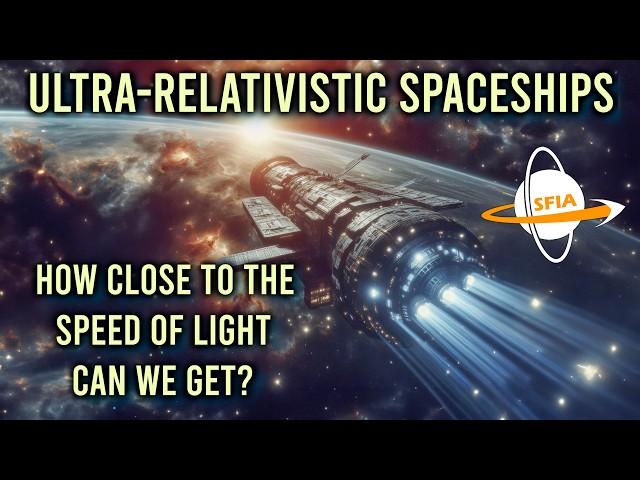
Ultra-Relativistic Spaceships: Racing Towards the Speed of Light
Комментарии:

Happy Thanksgiving 4202 . amen 🇺🇸 p.p.s. Mr. and Mrs.
Ответить
Our bodies would never make it. Is a laser probe even worth it when it takes hundreds of years to reach the target?
Ответить
Appreciate ya. Thanks for sharing.
Ответить
Best graphics and sci-fi concepts you'll see here on the Inter-cobwebs! That said, I'd like to say that travelling anywhere close to light speed thru space turns into buzz kill when you strike a BB gun-sized speck of ice/debris. Or hit Voyager I or II...OUCH! Wormholio/Cornholio/Blackholio is the only plausible way I see to haul my ass around the universe. Or Yucatanholio...
Ответить
Priorities: Lets start with something more plausible like FTL communications! This will have practical benefits straight away. Muon space telescopes? Why this fascination with FTL spaceships to go where exactly. World we live in is where we evolved and adapted to live so why this race to go to places less suited to humans. First look after and value the world we live in!
Ответить
Zoom!
Ответить
Reaching or exceeding the speed of light would generate a black hole 🕳
Ответить
Since you're addressing your speech impediment, allow me to say I see a huge improvement! As a non-native speaker I used to have problems understanding you and haven't had them at all recently.
Thanks for great content, as always!

Wanna hear him say E=MC2 again in the Elmer Fudd lisp
Ответить
Fusion ships for interplanetary travel
Black hole ships with plasma shields for interstellar travel
Btw would love to see a video on what technology can be achieved with plasma

Seeing the speed of light as a physical limit depends on the fact that most divulgation of the underlying science (including this one) omits a very important detail: the computations indicating that traveling at the finite speed of light require infinite energy are performed on a stationary frame of reference.
In simple words, 300km/sec (circa) is the maximum speed at which we observe objects moving with respect to us.
The reality is that (if you set aside for a moment the problem of particles hitting you with enormous energy), you can travel at any speed, and the quantity of energy needed to accelerate from 0 to 1m/s is the same you need to accelerate from 1e9 m/s to 1e9+1.
HOWEVER, this happens not in a pure space, but in a space-time universe. As you move in space you move also in time, and when you move fast this begins to be noticeable.
So, you can reach Proxima in a few years, days, minutes or seconds; indeed, the light arrives there in zero time, as it travels at an infinite speed -- traveling at a comfortable constant acceleration (for the first half of the trip, and then deceleration for the second half) of 1G, you can get there in less than 3 years.
The problem is that NOW, Proxima is in a space-time 4e16 meters AND 4.2 years away. NOW, Proxima is ALREADY at another time coordinate. C is the constant of how time varies in space-time per space-distance unit, at constant gravity. In other words, it's not the light that travels at 300,000 km/sec: the time of a point 300,000 km distant from you is one second away.
The Einstein equations allow to move the so called "proper time" of a traveling object into the space-time frame of reference of an object taken as "stationary". They tell you "what you see coming at you", rather than what what it actually is.
So, when you reach Proxima, no matter how much time you spent to get there, the time at the final destination will be the initial time difference plus the integral of the time you spent at each point in space -- given constant gravity during the trip, of course. In our example of traveling at constant 1G of acceleration/deceleration, the elapsed time registered on Proxima or Earth since your departure will be somewhere in the ballpark of 7 years, while your proper time would be about 2.7 years.
While this is explained often as "time dilation", the proper explanation of this effect is simply that wherever you're going, you're reaching a place that is also distant in time, not just in space, and when you're there you are at the time of that place, plus the time you spent going there (a bit more b/c of the time you spent in all the points in space to get there).
---
This also implies that any object traveling "faster than light" is actually traveling in time.
Suppose to have a warp drive that lets you break the C constant; now, you could be there in one hour of your proper time and 10 days of local time, or in 10 years of your proper time and 1 day of local time; it doesn't matter. For the sake of exposition, let's say that your warp drive is set so that your proper time is the same as the "rest of the universe", like in Star Trek, and that it takes 1 day of warp drive to arrive in Proxima.
But the time at Proxima is NOW 4.2 years away. To get there in 1 day, you actually need to travel at a more-than-infinite speed, and be there before NOW, 4.2 years (minus one day) ago. Or in other words, suppose you shoot a laser the moment you leave Earth; to see it shine at Proxima, you need to wait for 4.2 years after you arrive.
Now imagine the round trip: you leave Proxima 1 day after your arrival (the ray of light has just started is voyage), and shoot another ray of light; in 1 day you get back to Earth. But... to see the first ray of light you should have waited 4.2 years in Proxima, and to see the second ray you now have to wait 4.2 years on Earth...
This means that you're back 8.4 years (minus 2 days) before you leave!
Traveling "faster than light" is not impossible because you need infinite energy to reach 300,000km/s; it's impossible because the light travels at an infinite speed (and indeed, to reach it, you need an infinite energy). To travel "faster than light", you need NOT to travel, but to find a way to reach a place in a previous time -- or in other words, a warp drive is effectively a time machine.

Your speech impediment makes your pronunciation much more interesting. You say "lazors" and I fking love it. I wish this was the correct pronunciation.
Ответить
Ulfra-relativistic spaceships, we have the need for speed. :-)
Ответить
Simple Answer. The amount energy required to accelerate matter to C will un-matter all your matter. You’ll be traveling at light speed because you are now just light traveling at the speed of light.. scattered across the general direction of travel
Ответить
Tau Zero
Ответить
While I think that physics doesn't care about causality; that appearing to care about causality is just a side-effect, and that if some information successfully transited a wormhole to the same universe, physics would just proceed to iterate on it, I am also not a physicist. The difference between "all known laws of physics prevent causal paradox", and "physics does not allow causal paradox" is not one we can, at this point, answer.
Aside from the fact that physics is unlikely to be sentient in the first place, and this is just a metaphor.

Ion drive is so 2024. Warp drive that's the future. Warp 10 or 10 times the speed of light is achievable with this tech. I am captain Picard of the starship Voyager and approve this message. 🖖
Ответить
you missed a 9 i slowed it down to check
i am disappointed 😢

not to mention all the other things hitting you at speed above .4 C
Ответить
the AI thumbnail on this one is particularly bad
Ответить
😋
Ответить
Going past about 0.9 light speed is probably not feasible for manned craft because of the extreme radiation effects from interactions with the interstellar medium as the craft passes through, even with shielding.
Ответить
It’s very clear we’re going to need FTL if we really want to be serious about space colonization and not just send people to their deaths. the nearest star system is 4 light years away which means in the best case scenario colonies will have to wait 4 years if anything goes wrong (aka if anything goes wrong their dead) now put them on a planet completely hostile to life where they have to grow their food in pods which themselves waste energy just to keep them and their plants and animals alive, not to mention all the energy wasted just getting there. it’s very clear to me that any space colony will need constant support from earth until they reach stability, which is obviously impossible in other solar systems without FTL, my theory is where not going to even bother with interstellar travel until or IF we invent FTL. Think about it, there are places ON EARTH we haven’t colonized because they’re too inhospitable for us, and this planet is basically made for us.
Ответить
OK, so you get up to some high percentage of the speed of light to get to Alpha Centauri. You also need to slow down to achieve an orbit. So you need to counter all that speed, and not smashing the occupants into jelly doing so.. Where is all that energy going to come from?
Ответить
Why have I never heard that 'you gotta push your kinetic energy in addition to your mass energy' explanation before?! Makes things so much clearer.
Thanks.

Isaac Author: "first, you need to calculate the ratio of kinetic energy to mass energy by speed..."
Me: FTL drive go brrrrrr.

at those speeds, they aren't gas molecules, its a particle beam
Ответить
wonder if you could use Casaba howitzer to clear the path of space rocks?
Ответить
saw this video on my feed and thought 'idk, not in the mood for science' and hit refresh on the page, instantly I regretted it and raced the mouse cursor against my laggy pc, in a fraction of a second, I clicked the video. Just as the screen refreshed... GASP! Did it work? Where will we end up?! ... a few moments later and I see, we're here! yay
Ответить
I'm imagining a line of white picket fences in one axis and field of wheat in the other. I guess the light rail would need to counter balance?
Ответить
It'd take 7 months and 1 week to get to Proxima Centauri at .99 C due to time dilation, so it's not that bad not being able to go faster than light ;)
Ответить
Good plan but if can't go out own planet don't matter much .the technology live time can colonize own solar system 1000 years .have experience and now how survive spaces. Also contact experiments and build prototype device stellar travel.sad part we my not see it life time my be moon base 😅
Ответить
If the rich people thought they could profit we would be in space tomorrow. Someone just needs to spin it the right way at a place like the WEF. Mr. Arthur should go talk to them.
Ответить
Please forgive my previous insensitive comments about your accent. I had no idea it was a speech impediment.
Ответить
Light speed is a kind of suspended animation
Ответить
I loved the concept from heroic age anime, Of the star way. A column of space that links 2 stars together through gravitational pull on each other. Where time inside of that point speeds up rapidly compared to the outside universe allowing you to travel without breaking the laws of physics at what would appear to be insane speeds allowing you to traverse the Distance between those 2 starsAt near light speed but appear to be going several times the speed of light speed to the outside universe.
Ответить
2065
Ответить
But doesn't mass increase also apply to reaction mass? When you accelerate protons to near light speed in your mass driver you can put a lot more push into them than their rest mass.
Ответить
Sounds like it would be worth to rush your smaller building robots, not your colony ship, you have no reason to show up until some of that Dyson swarm is built.
Ответить
Few ever mention the problem of hitting something, even something extremely small, while travelling at tremendous speed in not-really-empty space.
Ответить
Isaac be saying 9 so many times, my dude be speaking German!
Ответить
Honestly, I don't see humans going beyond our solar system. We will probably send robots/drones long before humans. The real challenge of a deep space journey is keeping a crew alive also adds a lot of unnecessary mass to the ship and risk. Apparently just radiation shielding is a challenge to just go to Mars.
Ответить
Always happy to listen to Mr Isaac Arthur talk about our possible future
Ответить
Great presentation as usual. Thanks for great experience.
Ответить
We need to invent artificial gravity and better drive systems. The rest will come. Nuclear is a good enough and progress of safety and size are being made. Who knows maybe a higher race will give us some tick
Ответить
How great, I love the physics tweaking episodes!
Ответить
A "matter beam" is what I will forever call a squirt gun.
Ответить

























